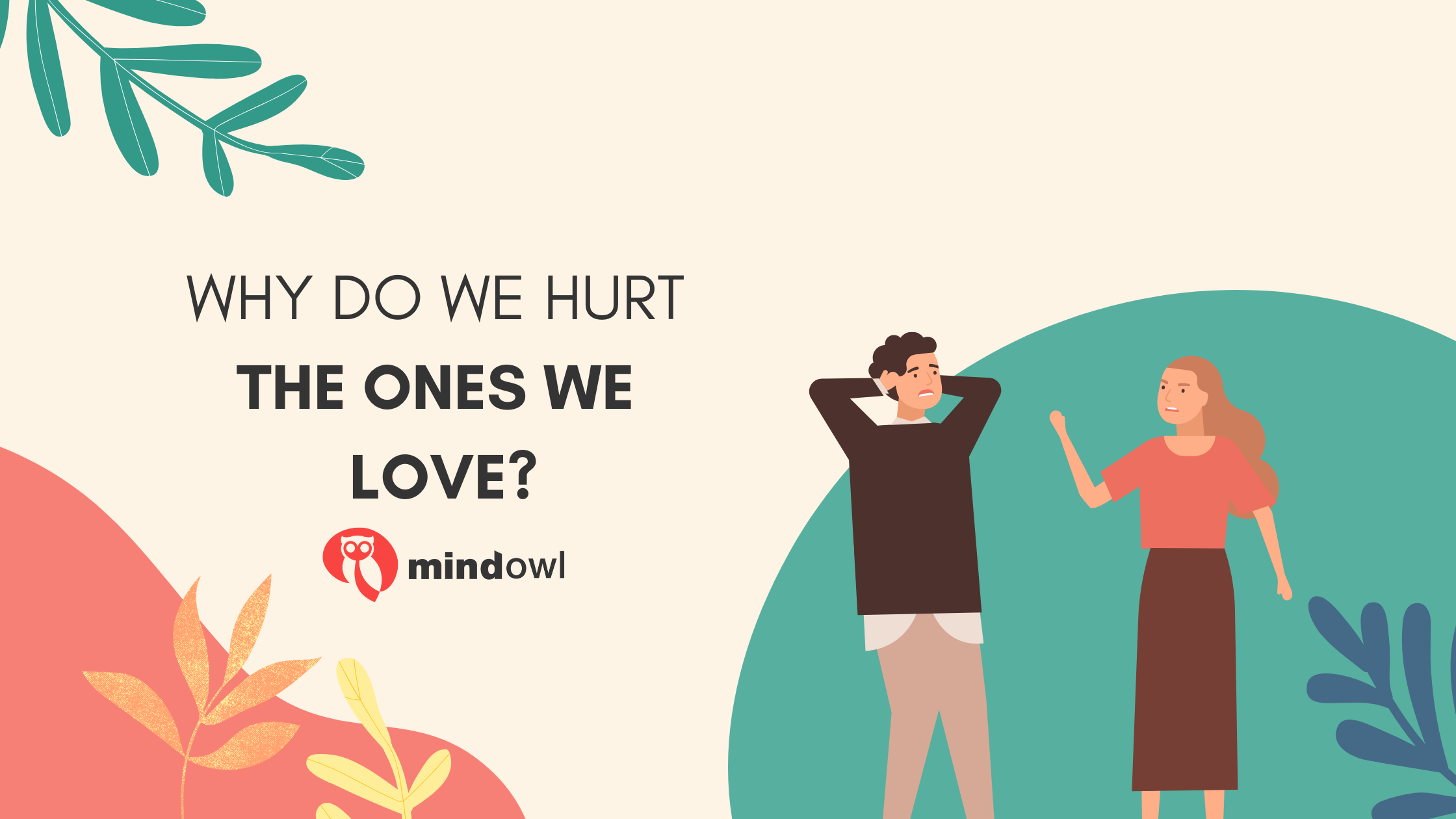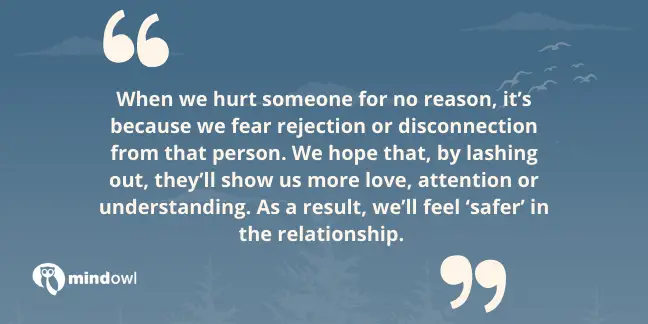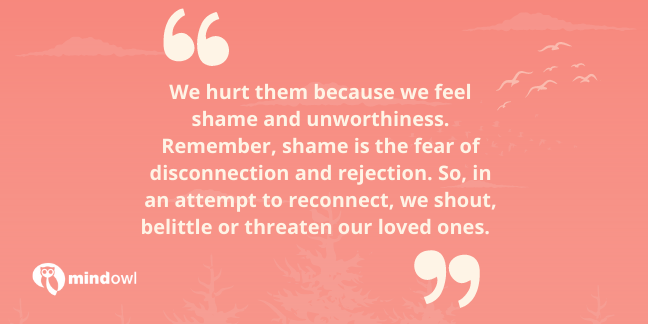We cherish the people closest to us, so it seems strange that we’d try to hurt them.
So, why do we hurt the ones we love? Often, it’s because we’re scared of losing them. Our bad behaviour is a desperate attempt to try and reconnect with them.
But bad behaviour doesn’t forge connections; it weakens them. To satisfy our need for connection, we should practise vulnerability instead. Being vulnerable allows us to form healthier connections with those around us.
Why do we treat our loved ones badly?
Have you ever shouted at your partner, and then immediately regretted it? Or, perhaps you lied to your partner’s face, ignored their calls, or tried to belittle them. Dr Robin Kowalski calls this “aversive interpersonal behaviour”.
Although these behaviours make us feel guilty, they can be hard to control. In fact, some people feel unable to stop hurting the people they love. Why is this?
Perhaps we behave badly in front of our loved ones because we feel ‘safe’ enough to reveal our true colours? This may be partly true, but it’s not the whole story.
In fact, we often hurt our loved ones because we don’t feel ‘safe’ and secure in the relationship.
Why hurting others helps us feel safe
When we hurt someone for no reason, it’s because we fear rejection or disconnection from that person. We hope that, by lashing out, they’ll show us more love, attention or understanding. As a result, we’ll feel ‘safer’ in the relationship.
So, we behave badly because we want to feel ‘safe’. But why do we feel insecure in the first place? Well, research suggests that insecurity is characterised by feelings of shame.
Shame (and the fear of disconnection)
Let’s define what we mean by shame. According to Brené Brown’s infamous Ted Talk, shame is “the fear of disconnection”. People who carry a lot of shame think they are “unworthy of love and connection”.
So, when we lash out at the people we love, it’s because we fear disconnection. The more shame we carry around with us, the worse our behaviour is. According to ScienceDirect, excessive shame causes people to act in self-destructive ways (i.e. lie, cheat, betray, shout).
When we fight with someone we love, we’re hoping the other person will reconnect with us. This would show us that we are worthy of love and connection (thereby reducing our feelings of shame).
This might sound a bit abstract, so let’s take a look at a few examples of bad behaviour.
“People who carry a lot of shame think they are “unworthy of love and connection”.”
– Brené Brown
Threatening to break up with our partner
Have you ever threatened to leave your partner when you knew you weren’t going to? This behaviour is fairly common in people who feel a deep sense of shame.
If we carry a lot of shame, we need constant reassurance from our partners that they are not going to leave us. Threatening to leave our partner is a cry for attention. We hope that, if we threaten to leave, they’ll reach out to us and show us that we are worthy of love and connection.
Crucially, this behaviour forces our partner to become vulnerable, whilst we remain ‘safe’.
Complaining about our partner’s annoying habits
Do you lose your temper at the smallest things? Perhaps your partner leaves dirty underwear on the floor, chews too loudly, or forgets to recycle the milk cartons. It’s natural for these things to frustrate us, but sometimes we over-react.
So, why do these insignificant habits make us so angry? Well, these habits threaten to disconnect us from our partner.
The fact that our partner forgets to recycle suggests that they are a bit careless. If they are careless about recycling, then perhaps they’ll become careless towards our relationship, too. If they don’t consider the future health of the planet, then perhaps they don’t care about our future, either.
We complain about these bad habits because we fear disconnection from our partners. Ironically, this causes further disconnection because it leads to arguments.
Being pessimistic about our partner’s achievements
When our partner is succeeding in life, we may worry that they’ll go off and find someone ‘better’ than us. We may belittle their achievements to stop them from becoming too confident. We want their confidence levels to match our own so that we can feel ‘safe’ and connected.
Trying to lower someone’s confidence is not an act of love. In fact, it will lead to feelings of guilt and disconnection.

Why do I feel shame?
Shame drives this bad behaviour, so it’s important to understand why we feel shame.
According to Brené Brown, shame occurs when people believe they are unworthy of love and belonging. This sense of unworthiness may have been formed in early childhood, due to an insecure attachment. Negative childhood experiences (such as bullying) can also make us feel unworthy.
Chronic shame is common in people with depression, social anxiety disorder, and eating disorders. However, shame is a normal human emotion and we all experience it to some degree. Shame can lead us down the path of bad behaviour if we don’t learn how to manage it.
Manage shame and embrace vulnerability
Remember, we said that shame is linked to feelings of unworthiness? Well, to manage shame, we need to believe that we are worthy of love and belonging.
It’s not enough to stand in front of the mirror and say, “I am worthy of love and belonging”. To truly accept we are worthy of love and belonging, we must be willing to be vulnerable.
So, let’s look at the previous examples and provide some alternatives:
- We should not threaten to leave our partner when we feel rejected. Instead, we should use that energy to connect with our partner (and develop our sense of self-worth).
- Instead of trying to control our partner’s ‘bad’ habits, we should accept them. Just because our partner forgets to recycle, this doesn’t mean our relationship is doomed. We can trust in our ability to connect with imperfect people.
- Instead of trying to destroy our partner’s confidence, we should lift them up. We should be positive about their future because we know it is important to them. We should try not to prioritise our own fears above our partner’s happiness.
So, instead of trying to be ‘safe’ in our relationships, we should allow ourselves to feel vulnerable. This will enable us to forge deeper connections.
Practising vulnerability in relationships
Becoming more vulnerable is a challenging thing to do, especially if you carry a lot of shame. Here are some tips to help you get started:
- Assume the best in others – If your partner hasn’t returned your calls, assume they are busy. Don’t jump to the conclusion that they are ignoring you. When you assume the best in others, you risk getting hurt. But you also have the best chance of connecting.
- Embrace Anekāntavāda – This is one of the central tenets of Jainist philosophy. It roughly translates as “many-sidedness”. According to this belief, no one has a firm understanding of reality. So, you should be humble enough to accept that you could be wrong about something. You might even be wrong about your sense of worthiness.
- Start conversations – If you’re afraid of losing your partner, start an honest conversation. Instead of threatening to break up with them, say “I’m starting to feel a bit left out, have you noticed any distance between us lately? We often avoid honest conversations because we don’t want to be perceived as weak. But, think of a time when someone was vulnerable in front of you. Did you think they were weak, or did you think they were courageous?
- Encourage others – When we encourage our loved ones to succeed, we focus on their best interests rather than our own. This can cause us to feel vulnerable because we fear getting left behind. But encouraging our loved ones helps to build meaningful connections.
So, why do we hurt the ones we love?
To sum up, let’s return to the initial question: why do we hurt the ones we love?
We hurt them because we feel shame and unworthiness. Remember, shame is the fear of disconnection and rejection. So, in an attempt to reconnect, we shout, belittle or threaten our loved ones. Reconnection is supposed to make us feel ‘safe’, but it doesn’t.
To stop hurting others, we must let go of our desire to feel ‘safe’. We should embrace vulnerability because it allows us to form authentic connections.
MindOwl Founder – My own struggles in life have led me to this path of understanding the human condition. I graduated with a bachelor’s degree in philosophy before completing a master’s degree in psychology at Regent’s University London. I then completed a postgraduate diploma in philosophical counselling before being trained in ACT (Acceptance and commitment therapy).
I’ve spent the last eight years studying the encounter of meditative practices with modern psychology.
3 thoughts on “Why do we hurt the ones we love?”
Leave a Reply
You must be logged in to post a comment.




Thanks Man, Your Information Really helped me. Good job and Thank you again.
Thank you! I’m glad you found it helpful.
How To Access A Quality Meditation Course In London
https://mindowl.org/meditation-course-in-london/